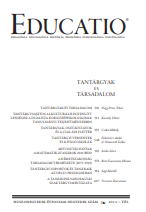A németszakosság társadalmi természete (1873–1945)
The Social Nature of the Choice of German at the Faculty of Arts
Author(s): Zsuzsanna Hanna BiróSubject(s): Language studies, Education, Fine Arts / Performing Arts, Foreign languages learning, Studies of Literature, Recent History (1900 till today), German Literature, School education, Higher Education , History of Education, 19th Century
Published by: Akadémiai Kiadó
Keywords: education; Germanism; 19th century; 20th century; German-language secondary education;
Summary/Abstract: The goal of the paper is to explore the social history of the teaching of German language and literature in secondary schools in a period in which the German language was necessary for intellect-based careers and in elite education (1895–1945). The researcher’s interest is in comprehending what was specific to humanities education and to the profession of teaching in a secondary school. The most relevant social factor motivating someone in a choice of German studies was ethnic provenience. The marker of being “German” identified in one’s personal name was less decisive in this respect than the ethnic character of the socializing environment of graduates of humanities. A further factor refers to the religious denomination of graduates – Jews, Lutherans and Unitarians can be said to have had more of an affinity for German studies; while the attitudes of Calvinists to German studies were negative. With an obvious over-representation of women, German studies graduates had usually descended from affluent families – and this was also reflected in study results. The most typical occupational areas where the parents of students pursuing German studies usually occur are those of the armed forces (soldiers, security and police), and professions associated with the intelligentsia where the German and Jewish middle-class were over-represented (doctors, physicians, lawyers, bankers, businessmen etc.). Surveys taking on board regions show that the most important environmental factor here was everyday utilization of the German language; thus, members of the German-speaking minority, Hungarians living in German-speaking areas of the Dualist Monarchy and also foreigners who utilised the German language in Hungarian-speaking areas as a “lingua franca” were all keen to choose German studies.
Journal: Educatio
- Issue Year: 21/2012
- Issue No: 4
- Page Range: 578-593
- Page Count: 16
- Language: Hungarian

